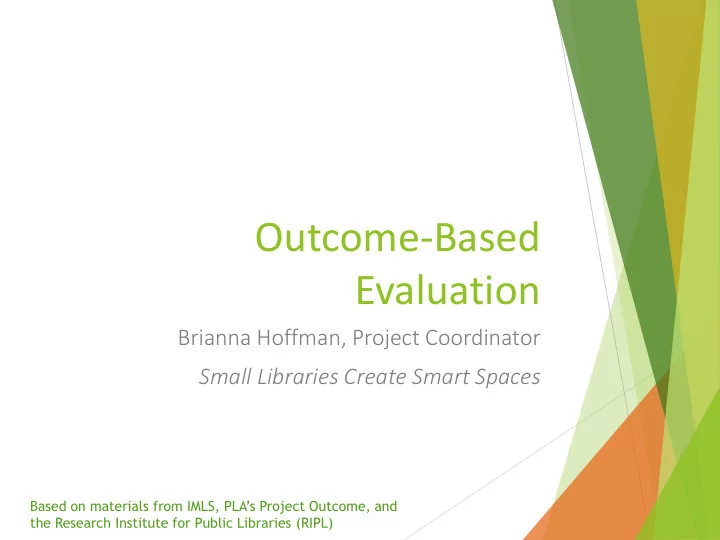

Outcome-Based Evaluation Brianna Hoffman, Project Coordinator Small Libraries Create Smart Spaces Based on materials from IMLS, PLA’s Project Outcome, and the Research Institute for Public Libraries (RIPL)
Outcome-Based Evaluation What is Outcome-Based Evaluation (OBE)? How do you measure outcomes? Why should you use OBE? OBE Tips, Tricks, and Tools
What is Outcome-Based Evaluation? IMLS defines OBE as a “systematic way of assessing the extent to which a program has achieved its intended result .”
So, what IS a “systematic way of assessing the extent to which a program has achieved its intended result?”
The Data Trifecta OUTPUT INPUT OUTCOME
The Data INPUT Trifecta Quantifying the effort expended on a program.
The Data OUTPUT Trifecta Level of services and materials provided. Or, put something in, get something out.
The Data OUTCOMES Trifecta Specific benefit user receives from the library program or service. Can be quan antitativ ive or quali alitativ ive. Expressed as ch changes th that in indiv ivid iduals perceive. Answers the question: “What good did we do?” “Outcomes are where the peo eople le come in” What changed for r th them?
Outcome-Based Evaluation Example Summer Reading Program at the Public Library
Outcome-Based Evaluation Example Summer Reading Program at the Public Library INPUTS Funding designated for SRP Number of Staff – Number of Children’s Librarians Children’s Librarian staff hours
Outcome-Based Evaluation Example Summer Reading Program at the Public Library OUTPUTS Number of SRP Events offered Total attendance of SRP Events Number of minutes participants spend reading Circulation of children’s materials
Outcome-Based Evaluation Example Summer Reading Program at the Public Library OUTCOMES “Children’s Enjoyment of Reading Increased.” “Children Maintained or Improved Reading Skills.” “Children were More Likely to Read by Choice.” “85% of K -6 Grade Library Card Holders Participated in SRP.”
HOW do You Measure OUTCOMES? Voting Ask! Observation Survey Evaluation Continuum/Likert Scale
The Survey Simple, Likert-Style PLA’s Project Outcome “Check all that apply” Impact Survey Open-Ended Questions
Voting Marble Jars
Observation How are patrons responding to programs? How do they interact with the program? How do they interact with the space?
WHY OBE? Strategic Plan Take what you are already doing, and align it to your strategic plan and goals. Know the extent to which you’ve met your goals Check progress made towards long-term goals Evaluating Programs or Services Does your program need more resources? Less ? None at all? Should you continue to offer a particular program or service? Community and Stakeholders Communicate the importance of your program, service or initiative to potential users, policy makers, resource allocators, library board
OBE Tips Work Backwards! INPUTS OUTPUTS OUTCOMES
OBE Tips Use the Logic Model! The LOGIC MODEL is a planning tool that helps you visually link your project’s anticipated results. Use it to map out your resources, key influencers, outcomes, inputs, outputs, data sources, goals, and targets. There are many examples of the LOGIC MODEL online that you can use to create your own to meet your library’s needs. Sample (basic) LOGIC MODEL:
OBE Tips Use the Logic Model!
OBE Tips “ Instead of using the logic model, the program is connected through a series of “so that” statements that show a progression of steps an individual takes through a program and the change each step is to encourage along the way.” “Outcomes, Impacts, and Indicators,” by Samantha Becker, LibaryJournal, September 18, 2015 http://lj.libraryjournal.com/2015/09/managing-libraries/outcomes-impacts-and-indicators/#_
OBE Tips YOU are the Expert! YOU are already doing this! “Evaluation” doesn’t have to be scary or complicated!
Additional OBE Resources https://www.oregon.gov/osl/LD/Pages/resources/OBE/o be.aspx#Sample_Outcome_Statements How the Oregon State Library is using OBE for LSTA grants. Includes links to webinars and tutorials http://managementhelp.org/evaluation/outcomes- evaluation-guide.htm Basic plan and guidance for non-profit organizations with very little resources https://infopeople.org/civicrm/event/info?reset=1&id=6 32 InfoPeople Webinar featuring Linda Hofschire, Director, Library Research Service, Colorado State University
Additional OBE Resources PLA’s Project Outcome https://www.projectoutcome.org/ Impact Survey https://impactsurvey.org/ IMLS Outcome-Based Evaluation https://www.imls.gov/grants/outcome-based-evaluations
Acknowledgements Association of Rural & Small Libraries (ARSL) is working collaboratively with us on all phases of the project. Project for Public Spaces (PPS) is providing subject expertise, consultation and instruction. This project is made possible in part by a grant from the Institute of Museum & Library Services, LG-80-16- 0039-16 Thank you!
Thank You! hoffmanb@oclc.org
Recommend
More recommend